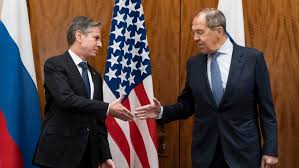U.S. Senators Propose Harsh Sanctions If Russia Disrupts Ukraine Peace Efforts

In a bold move aimed at holding Russia accountable, a bipartisan group of 50 US senators has introduced sweeping legislation that would impose severe sanctions on nations that continue to support Moscow if it derails the ongoing peace negotiations to end the war in Ukraine.
The new proposal threatens to hit countries that buy Russian fuel or uranium with a staggering 500% tariff if Moscow “refuses to engage in good faith” with Ukraine or disrupts the fragile ceasefire efforts.
The sanctions would also target any nations that continue their dealings with Russia should it escalate hostilities following the negotiation of a peace deal, including any new military incursions into Ukrainian territory.
The legislation, introduced by prominent senators including Republican Lindsey Graham and Democrat Richard Blumenthal, aims to push Russia into meaningful dialogue with Ukraine, hoping to end the brutal conflict that has devastated the region.
Despite ongoing peace talks, spearheaded by US President Donald Trump, there have been no significant breakthroughs. Earlier this month, Ukraine agreed to a 30-day ceasefire, but Moscow quickly rejected the US-backed peace plan, intensifying its rhetoric about replacing Ukrainian leadership and pressing ahead with its territorial ambitions.
Meanwhile, Ukraine continues to accuse Russia of prolonging the negotiations without genuine intentions to halt its aggressive actions.
Trump, who has been criticized for his mixed stance on the war, has directed sharp criticism at both Russian President Vladimir Putin and Ukrainian President Volodymyr Zelensky for the lack of progress. His administration’s attempt to broker peace has faced resistance on both sides, with Moscow showing no signs of relenting and Kyiv continuing to fend off Russian advances.
As diplomatic tensions escalate, Ukraine has reported new attacks on its northeastern border city of Kharkiv, underscoring the deepening divide and the growing urgency to bring an end to the war.
The proposed sanctions signal a powerful push from US lawmakers to hold Russia—and its international allies—responsible for further disruptions to the peace process.





